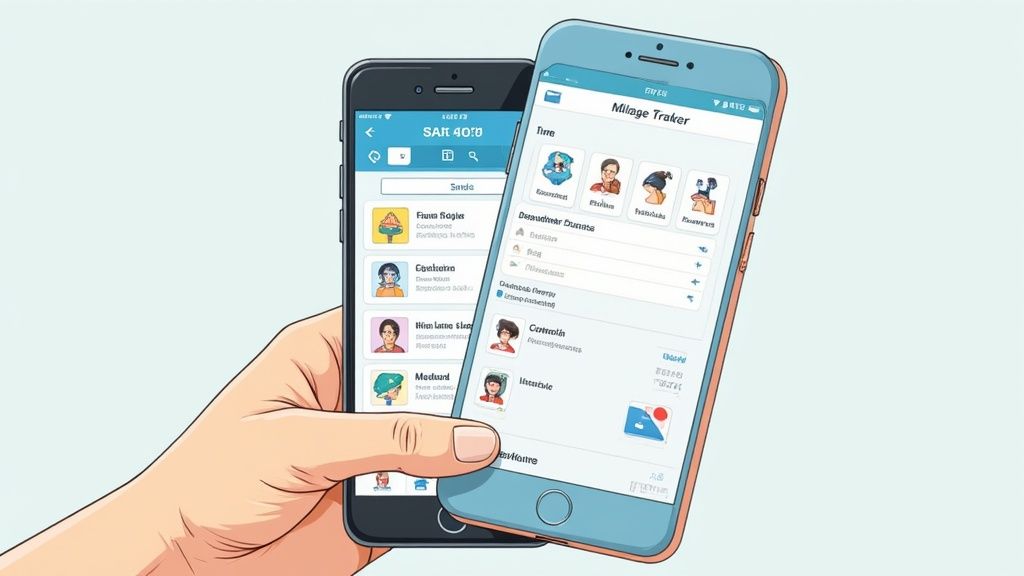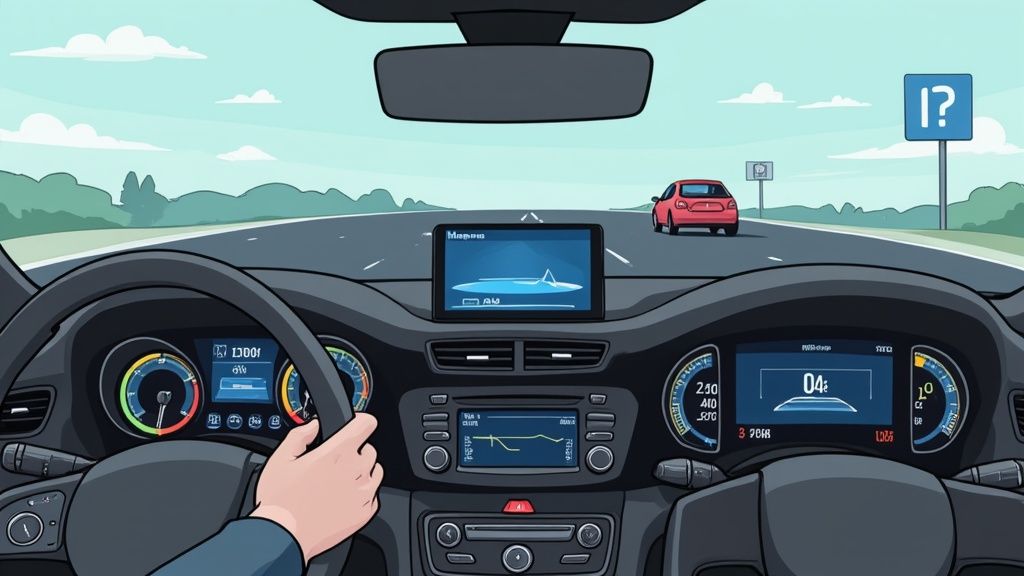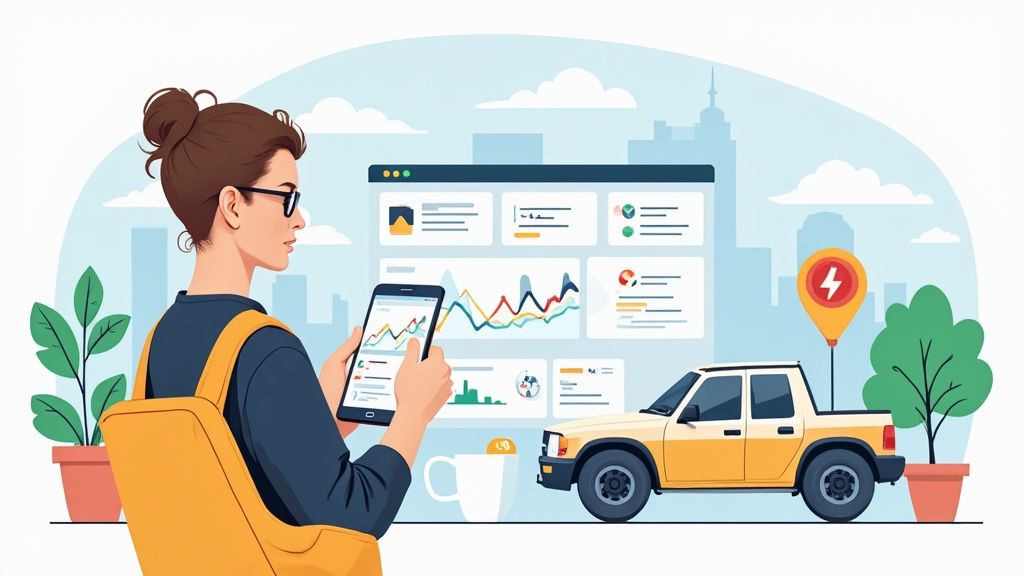
The Ultimate Guide to App Mileage Trackers: How Modern Technology Transforms Business Travel
Beyond Manual Logging: The App Mileage Tracker Revolution

The pen-and-paper method of tracking business miles is becoming a thing of the past. This shift represents more than just convenience - it’s changing how companies handle expenses and claim tax deductions. App-based mileage trackers are making it possible to turn a formerly tedious task into a simple automated process. But what specific advantages are businesses seeing from making this change?
From Lost Deductions to Found Money: The Real Cost of Manual Logging
When talking with business owners and tax experts, a clear pattern emerges - manual mileage logs often lead to mistakes and missed opportunities. Consider this: after a busy day of client meetings, how accurately can you remember every stop and distance? Even small oversights add up - forgetting to log a quick 15-minute client visit could mean losing hundreds in deductions over the course of a year. The time spent organizing receipts and calculating distances only makes things worse. One consulting company discovered this firsthand when switching to an app tracker revealed $15,000 in mileage deductions they had previously missed. This shows just how much money proper mileage tracking can save.
Automating Success: How Professionals Leverage App Mileage Trackers
More professionals are discovering how app trackers can help them claim deductions they used to miss. Apps like MileIQ record every business trip automatically, removing human error from the equation. The impact is significant - MileIQ reports tracking over 80 billion miles and helping users recover more than $10 billion in deductions and reimbursements. Features like automatic trip sorting and report generation also make tax prep and expense reports much simpler. As a result, companies can focus on their main business goals instead of getting caught up in paperwork.
A Seamless Transition: Moving From Manual to Automated Tracking
While changing from a familiar system can feel overwhelming at first, switching to automated tracking is usually straightforward. Most mileage apps make it easy to import existing records so no previous data is lost. For example, Auto Service Logger provides custom reports and personal support to help users adjust to the new system. This lets businesses keep their historical records while gaining the benefits of automation. The precise digital records also provide peace of mind during tax season by reducing audit concerns. Making the switch to app-based tracking helps companies work more efficiently while maximizing their allowable deductions.
Smart Features That Actually Save You Time

Moving from paper logs to a mileage tracking app does more than just digitize your records - it gives you powerful tools that simplify expense management. These apps go beyond basic GPS tracking by offering smart features that significantly reduce the time spent on administrative tasks, letting you focus more energy on running your business.
AI-Powered Trip Classification: Separating Business from Pleasure
Sorting through trips to label them as business or personal used to be a tedious manual task. Now, mileage tracking apps use smart technology to automatically categorize your drives. For example, the app learns your regular commute routes and marks them as personal trips. It can also recognize visits to client locations and common work destinations, minimizing the need for manual input. This automatic sorting makes tax preparation much easier since your trips are already organized and ready for reporting.
Automated Expense Categorization: Beyond Just Miles
Many modern mileage trackers now handle more than just distance logging. These apps let you attach receipts to specific trips and set up rules to automatically sort different types of expenses. You can simply take a photo of your gas receipt after filling up during a business drive, and the app will record the fuel cost and connect it to that trip. Apps like Auto Service Logger even track vehicle maintenance records, giving you one central place to manage all your vehicle-related expenses.
Intelligent Route Optimization: Saving Time and Money
While not strictly for mileage tracking, the route planning features in some apps can help you save significant time and money. By working with navigation systems, these tools suggest faster routes based on current traffic and road conditions. This helps you spend less time on the road while also reducing fuel costs and vehicle wear. These savings add up quickly, especially for businesses with teams regularly traveling to multiple locations.
MagicTrip and Smart Detection: Seamless Tracking
Many apps now include features like “MagicTrip” or smart detection that make tracking completely hands-free. These tools automatically start recording when you begin driving and stop when you park for a while. This “set it and forget it” approach means you no longer need to remember to start and stop tracking for each trip. By removing the need for manual input, these features help ensure all your drives are captured accurately without any extra effort on your part.
Maximizing Performance Without Draining Resources

A good mileage tracking app should work smoothly in the background without becoming a drain on your phone’s resources. Recent improvements in app design have made it possible to track your miles reliably while minimizing impact on battery life and data usage. This has opened up new possibilities for how these apps can operate efficiently.
Balancing Accuracy with Battery Life: Understanding Tracking Modes
Different tracking modes offer various trade-offs between precision and power consumption. Some apps rely on constant GPS tracking for exact locations, but this can quickly drain your battery. Others, like Auto Service Logger, use smarter approaches with motion detection to track trips accurately while using less power. Think of it like switching your car between sport and economy modes - you can choose the right balance for your needs. The key is selecting a tracking mode that matches your priorities for battery life and location accuracy.
Smart Data Management: Storing and Syncing Efficiently
How an app handles data storage and syncing directly affects its performance. While some apps keep everything on your phone, others sync regularly to the cloud. Auto Service Logger provides secure cloud storage so you can access your records from any device. To help manage data usage, many apps let you control when syncing happens - for example, only on WiFi. This is similar to how email apps let you choose between downloading messages immediately or waiting until you open them.
Practical Tips for Extending Battery Life
You can take several simple steps to help your mileage tracker run longer between charges. Lowering screen brightness, limiting background refreshes, and turning off location services when not needed all help conserve power. Regular updates to both your phone’s operating system and the tracking app often include battery optimizations. These small changes add up - for instance, studies show QuickBooks Self-Employed uses just 0.04% of battery per hour on average.
Choosing the Right App for Your Needs
The best mileage tracking app depends on how you plan to use it. Consider your typical driving patterns, how long you need your battery to last, and your monthly data limits. Research features like TripLog’s flexible auto-start options to find what works best for you. By understanding how these apps function and adjusting their settings thoughtfully, you can track your miles automatically without worrying about your phone dying mid-trip.
Building an IRS-Proof Mileage Log

Creating a proper mileage log is essential for maximizing tax deductions and avoiding IRS scrutiny. The IRS has clear requirements for what must be included in these logs. Modern mileage tracking apps make it much easier to maintain accurate records that meet all IRS standards.
Essential Elements of an IRS-Compliant Log
To pass IRS review, a mileage log needs specific details for every business trip recorded. The required information includes:
- Dates: When each trip occurred
- Mileage: Total business miles driven
- Destinations: Starting point and end location
- Purpose: Clear description of business reason (e.g. “Client meeting at ABC Corp” or “Supply delivery to warehouse”)
Missing any of these key details puts your deductions at risk of being rejected. Mileage tracking apps help by automatically capturing most of this information as you drive, reducing manual work and mistakes.
Making the Most of App Features
Apps like Auto Service Logger include helpful tools designed specifically for IRS compliance. For example, you can quickly mark trips as business or personal with a single swipe. The automatic trip detection and GPS tracking features also provide proof of your mileage claims.
Document Trip Purpose Clearly
The business purpose for each trip is critical for IRS acceptance. Simply writing “business” isn’t enough - you need to note specifics. Good mileage apps let you add detailed notes right after each trip. You can record which client you met with, what you discussed, or why the trip was necessary. Having these records tied directly to the mileage data strengthens your documentation if the IRS has questions.
Keep Your Records Safe and Accessible
Protecting your mileage records is vital. Just imagine losing months of log entries right before tax time. Quality mileage apps automatically back up your data to secure cloud storage. This keeps your records safe even if you lose your phone. The apps can also generate clear reports in different formats like CSV or PDF, making it simple to submit documentation for taxes or expense reports. These organized reports put all the required info in an easy-to-review format when you need it most.
Real Stories from the Road
A mileage log needs to be compliant and deductions maximized, but seeing how mileage trackers perform in actual daily use provides the most valuable insights. Let’s explore real examples of how professionals in different fields use these apps to solve their specific challenges.
The Real Estate Agent: Closing Deals and Tracking Miles
Consider a typical day for a real estate agent - showing multiple properties, meeting clients, and hosting open houses. Trying to manually log each drive becomes overwhelming quickly. A mileage tracking app proves essential in this environment. Using Auto Service Logger, agents can automatically capture trips between properties and easily mark them as business-related. This eliminates the hassle of reconstructing routes after a long day, helping agents save time while maintaining precise records needed for deductions.
The Field Service Technician: Managing Complex Routes
Field technicians often travel complex paths with multiple client visits each day. Keeping track of every stop and distance covered gets increasingly challenging with packed schedules. A mileage tracking app takes away this burden. The automatic trip recording lets techs concentrate on their work, confident that their mileage is being captured correctly. When it’s time to submit expense reports or claim tax deductions, all the needed information is ready to go.
The Small Business Owner: Balancing Multiple Roles
Small business owners split their time between client meetings, supply runs, and various business errands. Amid everything else they manage, tracking miles often gets overlooked. A mileage tracking app provides an effortless solution. The app can automatically log and sort trips, making sure no deductible miles slip through the cracks. This frees owners to focus on growing their business rather than handling paperwork.
Adapting to Specific Needs
While mileage trackers share basic functions, getting the most value means customizing them for your industry’s requirements. Understanding available features and adjusting settings to match your needs is key.
- Customizable Reporting: Create reports focused on specific time periods, clients, or projects based on your business needs.
- Integration with other tools: Connect your mileage tracker to tools like QuickBooks Self-Employed to simplify expense management.
- Team Management Features: For companies with multiple drivers, some apps provide central dashboards to oversee team mileage and expenses.
These capabilities let businesses set up systems that work smoothly with their current processes and meet their industry’s specific needs. This flexibility helps maximize efficiency while ensuring mileage logs meet IRS requirements.
Selecting Your Perfect Tracking Solution
Finding the right mileage tracking app requires careful evaluation of your specific business needs. Understanding what features matter most for your situation will help you choose a solution that saves time and money while meeting your requirements.
Key Considerations for Choosing an App Mileage Tracker
When evaluating the many mileage tracking options available, focus on these important questions:
- Budget - Compare free basic plans versus paid subscriptions. Auto Service Logger offers a lifetime membership that eliminates recurring costs while providing full feature access.
- Number of Users - For team environments, look for centralized dashboards and multi-user management capabilities.
- Automation Needs - Basic GPS tracking may suffice, or you might benefit from automatic trip detection and categorization.
- Software Integration - Consider whether connecting with tools like QuickBooks Self-Employed would help your workflow.
- Reporting Requirements - Evaluate what type of mileage analysis you need, such as sorting by time period, client, or project.
Evaluating Features Based on Your Business Needs
Different businesses require different tracking capabilities:
- Solo Entrepreneurs need user-friendly interfaces with automatic trip logging and simple expense sorting
- Small Businesses benefit from tax reporting tools, accounting software integration, and expense management
- Field Service Teams require route planning, team coordination tools, and detailed reporting
- Fleet Managers need GPS tracking, maintenance scheduling, and driver monitoring
Comparing Top App Mileage Trackers
| Feature | Auto Service Logger | MileIQ | TripLog |
|---|---|---|---|
| Tracking | Yes | Yes | Yes |
| Expense Categorization | Yes | Yes | Yes |
| IRS-Compliant Reports | Yes | Yes | Yes |
| Cloud Storage | Yes | Yes | Yes |
| Team Management | Limited | Varies | Yes |
| Lifetime Membership | Yes | No | No |
This comparison highlights key features, but remember that the best choice depends on your specific needs.
Making the Right Choice for Your Business
Take advantage of free trials to test different apps firsthand. Pay attention to ease of use, tracking accuracy, and customer support quality. Focus on finding a solution that fits naturally into your workflow while meeting your core requirements.
Ready to try a mileage tracker that makes logging trips effortless? Get started with Auto Service Logger today! Learn More